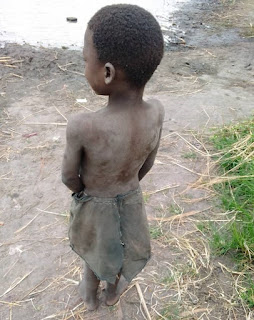SHOULD ABANDONED CHILDREN TAKE BACK ABSENTEE FATHERS?
There are a million reasons why
marriages fail. In addition, failed matrimonial unions have partners accusing
each other of causing the break-up. Usually, consideration of the fate of children
does not bother lovers-turned-enemies at all. Ultimately, innocent children
pay the heavy price.
Do you appreciate the value of growing up in a loving family? How much gratitude do your parents deserve if they endured so much to give you protection and a chance to grow up into a responsible person?
 |
| Lunga kid gazing at a doubtful distant future- Pic by LDA |
To understand why you must count your blessings if you had that tender loving care from both parents, think of those whose parents deprived them of that chance. Every normal and responsible person knows that children brought up in broken homes face serious challenges. Usually, they do not only miss that vital affectionate care but also many opportunities because of the lack of necessities of life.
But what does it mean to be brought up in a broken home? The truth is, there isn't one definition. For some, growing up in a broken home means enduring physical or sexual abuse. For others, growing up in a broken home means living in a household that didn't "look" broken from the outside, but was emotionally painful or neglectful.
Slowed academic development is another common way that separation of the parents affects children. The emotional stress of a divorce alone can be enough to stunt your child's academic progress, but the lifestyle changes and instability of a broken family can contribute to poor educational outcomes.
We see children brought up in such homes struggle to make up for lost opportunities in their adult life. Therefore, it is unfair, inconsiderate, and downright irresponsible for anyone in a privileged position to look down on people whose background they little appreciate.
Yes, after the age of 18, one is supposed to design their own life. However, we all know that a firm foundation is necessary for any strong structure. That includes life.
I will, in this article, focus on
what was cooked in the Bangweulu catchment area’s pot of life, a trend, which is
still obtaining in the Bisa-Unga area. It used to be prevalent in my time as a
boy and was one of the causes of ineffable poverty in a number of families. I
call it here the hire, sire, fire, and reclaim debacle.
This was a ridiculous practice,
condoned in our contemporary society, where a man will enter into a marriage of
convenience with a woman when he was ill-prepared. Either he had no intention
of marrying or he needed a woman for economic support. Many a time, such men
would rapidly sire a child or two and abandon the family or better stated,
fire his alleged wife on very flimsy misgivings. He would then go for years,
becoming incommunicado.
The poor woman would remain with
the responsibility of looking after those children without any material, financial,
and moral support whatsoever from the so-called father of the children. In
order to survive, and usually out of desperation, at times the woman would remarry.
As may be expected, unable to take
care of stepchildren, the second man would also abandon the woman; often, he
would have left the victim with one more baby. Therefore, the poor mother’s
woes of fending for her children kept growing. Both her children and she became
vulnerable and miserable.
As if these reckless men’s indecent
behaviour was not enough, the first “husband “would reappear later and claim
that he was still married to the woman. He would concoct some anecdote to the
extent that he had just gone to visit, or had been on an impossible mission, and
any such stupid story. He would organize his family to terrorize and impeach
the offender; find him guilty of adultery, and ask him to pay for marriage
interference or something to that effect. Suddenly the neglected woman turns
into some kind of commercially valuable stock for the conman. Even where this
scammer is lucky and received damages, locally termed ukuliilapo, he would not share that undeserved fortune with his
children.
Sometimes, the “adulterer” would also repeat
the circus by charging the third man who married the woman. The community would
take a laissez-faire approach in the name of tradition and would look the other
way. Meanwhile, the woman had no slight idea that she could seek recourse from
the courts.
The climax of this irritating
drama would come when the mother, after having struggled to bring up these
children single-handedly, makes it possible for the kids to become successful
in life. Now, the two impostor fathers will vehemently reclaim ‘their’
children. They would declare that these children unquestionably recognize them,
because obviously, “the now well-to-do, popular, or famous children are
carrying these men’s blood.” In
addition, the “blood is thicker than water,” anthem becomes more pronounced and
would resonate everywhere in the community. As if this mischievous behaviour is
not annoying enough, the relationship between these children and their absentee
fathers’ relatives is supposed to be cemented, or else!
What imprudence!
Anyway, let me leave judgment to
you, the reader, and simply hope this kind of scenario is dead and buried in
our rural areas. Unfortunately, nothing significant happens to encourage
behavioural change in these places. It is God’s case.
However, the question is, would
children fathered by such men be justly vindicated if they disowned their
father? What is your take?
 SoundCloud
SoundCloud



Comments